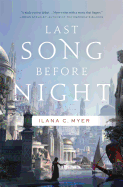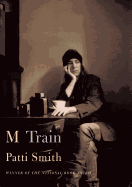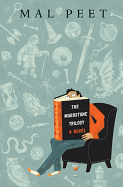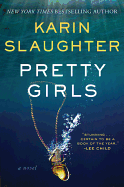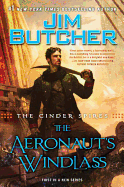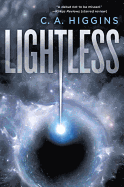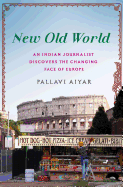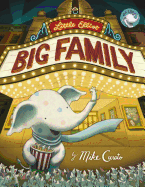Tuesday, October 6, 2015
Elena Ferrante is a phenomenon. The Italian novelist has used a pen name since the publication of her first novel, The Days of Abandonment; she avers that "books, once they are written, have no need of their authors." Speculation about her identity is widespread, driven by the fervor of her fans and adulatory reviews. Her four Neapolitan novels are wildly successful: Book 4, The Story of the Lost Child, debuted at #3 on the New York Times bestseller list late last month; book 1, My Brilliant Friend, hit the list in 2012. All four books (Book 2, The Story of a New Name; Book 3, Those Who Leave and Those Who Stay) are national Indie Bestsellers.
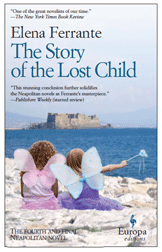 According to Michael Reynolds, editor-in-chief of Europa Editions, her publisher in both the U.S and U.K., this is thanks to the unwavering support Europa and Ferrante have received from independent booksellers from the beginning, when Europa published Ferrante's first book in 2005. Reynolds says it found a small but devoted readership largely through indie handselling. Since then, her readership and sales have grown because of the booksellers' commitment: "We are closing in on half a million copies sold of the Neapolitan series. The proportion of our sales through indie channels is much higher than the industry average. This has always been true for all books on our list. The fact that this proportion remains constant is testament to the vitality of independently owned bookstores and their effectiveness in 'moving units,' as they say. The degree to which independent stores can be effective is too often downplayed." He believes that the success of both Ferrante and Europa Editions has only been possible "because we enjoy close and fruitful partnerships with independent retailers. Ferrante's current success is nothing if not an all-indie success story that has been 10 years in the making." --Marilyn Dahl, editor, Shelf Awareness for Readers
According to Michael Reynolds, editor-in-chief of Europa Editions, her publisher in both the U.S and U.K., this is thanks to the unwavering support Europa and Ferrante have received from independent booksellers from the beginning, when Europa published Ferrante's first book in 2005. Reynolds says it found a small but devoted readership largely through indie handselling. Since then, her readership and sales have grown because of the booksellers' commitment: "We are closing in on half a million copies sold of the Neapolitan series. The proportion of our sales through indie channels is much higher than the industry average. This has always been true for all books on our list. The fact that this proportion remains constant is testament to the vitality of independently owned bookstores and their effectiveness in 'moving units,' as they say. The degree to which independent stores can be effective is too often downplayed." He believes that the success of both Ferrante and Europa Editions has only been possible "because we enjoy close and fruitful partnerships with independent retailers. Ferrante's current success is nothing if not an all-indie success story that has been 10 years in the making." --Marilyn Dahl, editor, Shelf Awareness for Readers
Pretty Girls
by Karin Slaughter
After drinks one night, wealthy architect Paul Scott becomes amorous and pulls his wife, Claire, into an alley for some sexy action. His spontaneity has disastrous results and destroys Claire's glamorous life. In the aftermath, she finds she may not know her husband as well as she thought--or at all.
Claire reaches out to her sister Lydia Delgado for help, and the two have an uneasy reunion. They've been long estranged, with Lydia ceasing contact after the 1991 disappearance of their eldest sister, Julia, from her college campus. But another coed has recently gone missing, and Claire and Lydia think the disappearance is somehow connected to their sister. They embark on a mission to solve finally the mystery surrounding Julia, braving great danger while reopening old wounds that never completely healed.
Pretty Girls, Karin Slaughter's second standalone after the Edgar-nominated Cop Town, is told from three points of view: Claire's, Lydia's and that of their father, Sam, via his old journal entries. Together they show the shattering effects of loss on a previously healthy family, how not knowing if a loved one was still alive could cause the ones left behind to stop leading their own lives.
The novel is devastating when focused on this, which makes the gory details of certain crimes seem jarring and unnecessary. It might have been more effective breaking readers' hearts without churning their stomachs, too. But Girls is a powerful examination of grief, and thriller fans will get more than their money's worth. --Elyse Dinh-McCrillis, blogger at Pop Culture Nerd
Discover: Two sisters reunite after a shocking crime and long estrangement to solve the mystery of their sister's 24-year-long disappearance.
Science Fiction & Fantasy
Last Song Before Night
by Ilana C. Myer
Ilana C. Myer's Last Song Before Night plunges readers into a world where nobles possess all the power, except for one: music. In the past, music and the poets who practice it held sway over kings, but the magic is no longer as powerful. The poet-musicians in Myer's novel are still the thinkers and dreamers in her medieval society, reminiscent of Plato's philosopher kings, but they have now been forced into subservience.
The story opens in the normally peaceful city of Tamryllin, where a noble is murdered. This violent act turns out to be one in an ongoing series of brutal deaths about which few residents know any details. Meanwhile, Lin is an aspiring poet who has come to visit Tamryllin to compete in its prestigious music festival. She ran away from an affluent family after suffering much abuse, and is notable for being the first woman poet. She works with her music partner for the promise of the Silver Branch, the prize awarded to the best musician at the festival. But to win, they must compete against a young duo whose natural talent and cheek have already made them legends.
As the story escalates, connections form to link the murders, the legendary duo and the competition. When Lin realizes the contest is a stage for betrayal and a means for dark magic to rise, she begins a gripping journey that redirects the course of her life and the welfare of the world, forever. --Justus Joseph, bookseller at Elliott Bay Book Company
Discover: A story of a world in which poetry and song once contained magic and where a corrupt power threatens to end all human life.
The Cinder Spires: The Aeronaut's Windlass
by Jim Butcher
On a world whose mist-shrouded surface is haunted by monstrous creatures, humans live in miles-high Spires built by semi-mythical ancestors. Each Spire is a state unto itself, trading and waging war with its neighbors via airships. These ships, and most other forms of technology, use an omnipresent magical force called ether.
Captain Grimm, a disgraced former member of Spire Albion's military, preys on trading ships from Albion's perennial enemy, Spire Aurora. When his ship, Predator, is grounded after a close call with an infamous Auroran battleship, Grimm is enlisted by Albion's enigmatic leader, the Spirearch, to escort a team investigating ominous tidings in the Spire's lower levels. A crippled Predator transports an etherealist (someone able to harness ether without using technology) and his assistant; rookies from the Spirearch's Guard of various social strata; an intelligent if insufferably arrogant cat; and Grimm's own battle-hardened crew into a mystery that may ultimately involve the ancient Enemy that forced humanity into Spires in the first place.
The Cinder Spires: The Aeronaut's Windlass marks the beginning of a new fantasy series from Jim Butcher, author of the Dresden Files and Codex Alera series. Though his steampunk world is sometimes as ill defined as its mysterious foggy surface, Butcher's premise is intriguing enough to sustain this lengthy novel. Intermittent periods of sagging plotlines mired by predictable fantasy tropes are blasted away by mesmerizing airship battles and generally likable characters. The Aeronaut's Windlass will entertain fans of the genre and bodes well for future Cinder Spires novels. --Tobias Mutter, freelance reviewer
Discover: This is the promising start of a fantasy/steampunk series from the author of the Dresden Files.
Lightless
by C.A. Higgins
First-time novelist C.A. Higgins has a degree in physics that informs every exciting moment of her first book, Lightless, a brilliant, speculative look at artificial intelligence. The novel takes place aboard the military spacecraft Ananke, the most mysterious and powerful ship in the System, a planet-spanning totalitarian government that uses omnipresent cameras to guarantee the loyalty of its citizens.
Computer expert and ship mechanic Althea has formed a surprising, wordless bond with the computer system that manages every bit of the Ananke's day-to-day existence, including life support, propulsion, food and air. Captain Domitian and chief scientist Gagnon provide human contact, but it's the ship and its complex levels of code and instructions that Althea truly loves.
When terrorists board the Ananke, bypassing the space vessel's security, Althea is both appalled by the attack and intrigued by its technical prowess, and helps to capture the leader of the raid. Leontios Ivanov is a charismatic, highly intelligent man, who has layers upon layers of complexity brought to light when an egocentric and perhaps sociopathic System operative arrives on the Ananke to interrogate Ivanov.
Matters start to get scary as Althea loses control of her ship. Ananke begins to show signs of its own chaotic intelligence, and the crew wonders how much worse their circumstances can get. The claustrophobic, tightly woven story of Lightless shows a new talent at full beam. C.A. Higgins is a bright new star in the genre of hard SF. --Rob LeFebvre, freelance writer and editor
Discover: This gripping thriller is rife with believable scientific speculation about artificial intelligence and space travel.
Food & Wine
Cook for Your Life: Delicious, Nourishing Recipes for Before, During, and After Cancer Treatment
by Ann Ogden Gaffney
Ann Ogden Gaffney founded Cook for Your Life, a nutritional program offering free cooking classes for cancer patients and now presents a cookbook written with the belief that "good food is one of the most underestimated elements of successful cancer treatment."
As a two-time cancer survivor, Gaffney understands what is needed before, during and after treatment, including which foods can provide symptom relief, fulfill nutritional needs and allow a sense of control during a chaotic time. The cookbook is organized according to a patient's needs, both emotionally and physically, and according to the stages of cancer treatment. Sections like "Simple" or "Soothing" are tailored to the worst days of radiation or chemotherapy, with recipes like Breakfast Quinoa with Green Tea and Dates, Arugula Pesto with Whole-Wheat Spaghettini, and Tarragon and Lemon Chicken Soup with Orzo. For days when energy and appetite resurface, sections like "Spicy," "Safe" and "Sweet" include recipes for Kimchi Grilled Cheese Sandwich, Egg Quesadilla with Sauteed Mushrooms, and Poached-Pear Bread Pudding. And the section titled "Scrumptious" is perfect for healthy survivorship, with recipes like Fish Tacos with Red Cabbage Slaw, Beet Risotto, and Chile Rellenos.
Recipes include tips for ingredient substitutions and adjustments, time-saving tricks and ways to modify recipes according to specific dietary recommendations (for example, an antimicrobial or bland diet), treatments or side effects (like nausea and fatigue). Cancer patients often have little appetite or may crave the empty calories of comfort food out of fear. Gaffney understands that calories must be nutritious, satisfying and easily attainable. --Kristen Galles from Book Club Classics
Discover: How important good food is as an element of cancer treatment.
Biography & Memoir
M Train
by Patti Smith
M Train, Patti Smith's follow-up to her memoir Just Kids, confirms her as a deliberate, observant, refreshing writer. No longer just a kid inhaling the artistic energy of New York, Smith is now in her late 60s and mostly alone. She's lost her husband, brother and dear friend Robert Mapplethorpe. Her son and daughter are grown and straddling 30. "How did we get so damn old, I say to my joints, my iron-colored hair," she reflects in her Greenwich Village apartment. "I [miss] that particular version of me, the one who was feverish, impious. She has flown." Writing is her solace. Coffee is her fuel. Her apartment is a mess of manuscript drafts and unfinished canvases, but it is a temple to "the centrality of work in a life.... Here is joy and neglect. A little mescal. A little jacking off, but mostly just work."
Drifting between the present and the past, M Train is stitched from Smith's memories and journals of travels and coffee houses around the world. Her journeys take her to Genet's prison in French Guiana, Mishima's Tokyo, Kahlo's and Rivera's Coyoacán, Bowles's Tangiers--and to Far Rockaway in Queens, where she impulsively buys a rundown bungalow near the boardwalk before Hurricane Sandy nearly blows it away.
Illustrated with several of her signature Polaroids, M Train is an affirmative, meandering story of a life shaken by tragedy but also buttressed with moments of joy and discovery. She embraces what she has and what she had. With each new book or song or poem, Smith adds another wreath to her already stout steeple. --Bruce Jacobs, founding partner Watermark Books & Cafe,Wichita, Kan.
Discover: Patti Smith follows her NBA-winning Just Kids with an equally accomplished, more melancholic, memoir of life and loss.
I'll Never Write My Memoirs
by Grace Jones and Paul Morley
In 1981, Grace Jones wrote and sang the lyric "I'll never write my memoirs" on her fifth album, Nightclubbing. Happily for readers, she's changed her mind. "If you do not want to limit yourself, then be prepared to change your mind--often," she writes. With I'll Never Write My Memoirs, Jones proves to be as captivating and eccentric a memoirist as she is a performer.
The Jamaican-born Jones is an original thinker and her writing reflects her quest to learn about the world and her place in it. She explains, "To write this book is being vulnerable, and it is the only way it will work--not to close off but to open up, which takes a lot of strength." This is a woman who devotes four pages to her first orgasm and an entire chapter to why she never arrives on time. When she turns her laser-sharp attention to celebrities around her, she creates concise and illuminating portraitures.
At almost 400 pages, I'll Never Write My Memoirs never slows its pace. Jones captures the raw hurt of her abusive childhood, the confusion of watching her friends die during the early AIDS outbreak, and the joy of becoming a grandmother. Although she studied acting and was cast in a few high-profile films (A View to a Kill; Vamp), she writes, "The film business was a motherf*cking monster, and one that would have killed me if I had kept going." Jones and her co-author, music journalist and producer Paul Morley, spin a fascinating epic of life among international models, musicians and filmmakers. --Kevin Howell, independent reviewer and marketing consultant
Discover: The captivating international world of music and filmmaking through the keenly observant eyes of iconic singer Grace Jones.
Business & Economics
Saving Capitalism: For the Many, Not the Few
by Robert B. Reich
"We are all stakeholders in the American economy, and most stakeholders have not done particularly well," explains Robert Reich (Supercapitalism). In Saving Capitalism, Reich argues that the notion of a choice between free market and big government is inherently flawed and masks the true issues, thereby preventing the solutions that can help the majority of stakeholders.
Reich outlines the argument that markets depend on the design, organization and enforcement of rules governing property, monopoly, contracts and bankruptcy. In other words, markets rely on government for their existence. By disguising this fact in a partisan battle, large corporations, Wall Street and the extremely wealthy hide their ever-increasing influence on market decisions.
Reich points out that what these powerful entities are doing is neither corrupt nor irrational. However, they are working to undermine the system as a whole. When a continually growing number of people have fewer resources to invest and less power to incite change, the market cannot be sustained and will ultimately fail.
Saving Capitalism also offers potential solutions for reversing the downward spiral of the American economy. These solutions involve the stakeholders overcoming political divides and uniting their voices--as well as votes--in a common economic cause.
Accessible, well documented and passionately insightful, Saving Capitalism is likely to evoke strong emotions in readers, which is certainly what Reich sets out to do since he proclaims, "The only way back toward a democracy and economy that work for the majority is for the majority to become politically active once again, establishing a new countervailing power." --Jen Forbus of Jen's Book Thoughts
Discover: A former U.S. Labor Secretary and current Berkeley professor of public policy offers a solution for rescuing American capitalism.
Social Science
New Old World: An Indian Journalist Discovers the Changing Face of Europe
by Pallavi Aiyar
In 2009, journalist Pallavi Aiyar (Chinese Whiskers) moved her family from Beijing, where she had been a foreign correspondent, to Brussels for a new job reporting on Europe for India's Business Standard. In New Old World, she combines her firsthand experiences with investigative reporting to describe "what a First World crisis looks like from an emerging country point of view."
Aiyar feels at times that she "had not left communist China for capitalist Europe but capitalist China for a very socialist Europe." She finds that in many ways the middle classes of the developing world have a more comfortable life than their European equivalents, and that the most obvious difference between life in the developing and developed worlds is in the quality of health care and environmental safety. She has a wry view of the relative "Decline of Europe," saying "If Europe were no longer as dominant in the world because other nations... were finally catching up, shouldn't this, in fact, be celebrated rather than bemoaned?"
She dissects the politics of the fiscal crisis and the Copenhagen climate change talks, and compares longstanding European disunities with the new anti-immigrant, anti-Muslim backlash. Europeans often appear reflexively hostile to irrevocable changes exemplified by Chinese and Indian takeovers of European diamond, wine and steel industries, Sikh farm laborers in Italy, and elite Chinese children on "study group tours" seeing the sights, scorning the schnitzel and spending thousands at German luxury shops.
Aiyar is sharp, funny and knowledgeable. She brings an outsider's skepticism to the much-discussed problems of the European Union and what she considers its declining global importance, leadership and economic strength. --Sara Catterall
Discover: An Indian journalist analyzes Europe's changing place in the world.
Body, Mind & Spirit
Me, My Hair, and I: Twenty-Seven Women Untangle an Obsession
by Elizabeth Benedict, editor
"We are the only mammals who braid, knot, powder, pile up, oil, spray, tease, perm, color, curl, straighten, augment, shave off, and clip our hair," notes Siri Hustvedt, one of the 27 contributors to Me, My Hair, and I.
The writers are diverse, but their hair experiences bear similar weight. Marita Goldman recalls the ordeal of straightening: "I was not to face the world until my hair looked as near as it could to 'good hair,' also known as 'White girl's hair.' " Young Hindu Bengali girls' heads are shaved in the belief that a second growth will be fuller and thicker, Bharati Mukherjee relates. Deborah Feldman remembers her ritual head shaving after her wedding, grateful she would now fit in with a community of wig-wearing Hasidic wives.
Who knew that hair would prompt so many stories of emotional turmoil? "We get that hair is serious," editor Elizabeth Benedict writes. And business is here to help. According to Goldman Sachs, the hair-care industry is worth $38 billion a year in products alone, reports Patricia Volk, admitting to 10 bottles of hair products under her sink for her "curly season" and another seven for summertime.
Sorrows--chemotherapy-induced hair loss, family spats over styles, the angst of to-color-or-not--are balanced by humor and hilarious admissions. "Rather than depressing me, every glance in the mirror at my gray hair has become a carpe diem moment," Anne Kreamer concludes. Anne Lamott's dreadlocks decision, perms gone frizzy, orange juice–can rollers and ironing mishaps--this collection will comfort readers remembering their own hair stories. --Cheryl Krocker McKeon, manager, Book Passage, San Francisco
Discover: In essays, 27 authors recall the braids, perms, colors, bobs and traditions of their hair.
Children's & Young Adult
The Murdstone Trilogy
by Mal Peet
In the dryly hilarious, profane, genre-bending novel The Murdstone Trilogy by the late British author Mal Peet (Keeper), the hard-drinking, middle-aged Philip Murdstone is in "self-lacerating mode."
He has hit a wall in his writing career. Quite simply, his "lovely sensitive novels" are no longer selling. Fantasy is the money-maker. Asked by his agent, the "gorgeous, masterful and unshaggable" Minerva Cinch, with creating a high-fantasy trilogy--"Tolkien with knobs on"--Philip knows he's in over his head. He has neither experience with nor love for fantasy books. On a drunken walk through the outskirts of his British village, Philip hears two voices, one ancient, one "light and hoarse," begin to weave an incredible tale--a tale that Minerva could easily sell to the fantasy-hungry market. The hoarse voice is that of the dwarfish, childlike yet ancient-eyed Pocket Wellfair, a Greme of the Realm currently under attack by Morl. Pocket offers a deal: "straight arsy-varsy. I send you the rest [of the story], you get me the Amulet of Eneydos," a powerful relic hidden in the human world. With an oath sworn the Greme way, "on our eyes and eggs," Philip finds his reality colliding with a frightening, phantasmagorical domain he didn't know existed.
The Murdstone Trilogy, originally published in the U.K. as an adult title, is brilliant. Richly drawn characters ground the story, even at its wildest, and older teens steeped in the fantasy traditions of what Minerva describes as "Dwarves. Beards. Time and dimension shifts.... You know." will revel in this wonderfully witty, upside-down take on the genre. --Kyla Paterno, reviewer
Discover: A stalled-out British author makes a bargain with an otherworldly stranger to save his career--and a magical realm--in Mal Peet's last novel.
Little Elliot, Big Family
by Mike Curato
Little Elliot, a very small, polka-dotted elephant from 1940s Manhattan, met his best friend in Mike Curato's Little Elliot, Big City. But now, in Little Elliot, Big Family, he feels quite lonely when that best friend, Mouse, scurries off to a family reunion without him.
Elliot decides to leave his quiet brownstone to take a walk through the city streets. Nostalgic, Edward Hopper-esque scenes (in "pencil with digital color," says Curato) capture the essence of New York City in the winter: a ride on the subway with bundled-up people, Central Park's leafless trees, children skating at Rockefeller Center. No one notices the small elephant, but he sees fathers and daughters, sisters sharing secrets, grandmothers singing to babies... and it makes him feel even more alone. Then Elliot hears his name in the night. "Was it the wind? No, it was Mouse. 'I missed you!' said Mouse. 'I missed you too,' said Elliot." Without further ado, Mouse and Elliot traipse off to the family reunion--a lavish candlelit feast in a human's attic, dotted with dozens of white mice dancing, eating and making merry amid golf clubs and steamer trunks. (A sneak preview of the party in the opening pages shows the mice using bottle caps for plates and alphabet blocks and spools of thread for seats, Borrowers-style.) And, "At the end of the day, Mouse counted the whole family again... and added one more."
Elliot's warm welcome into the mouse family is a happy ending to this aching story of longing to belong. --Karin Snelson, children's editor, Shelf Awareness
Discover: Elliot, the elephant from New York City, and his best friend, Mouse, star in this satisfying-as-cheese-chowder story of friendship and family.


